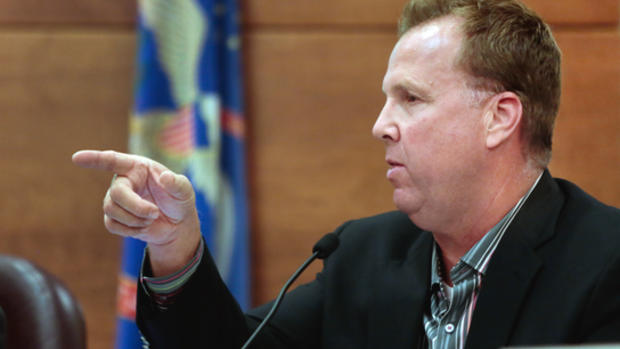If It’s Ok to Be Concerned About Oil Workers, It’s Ok to Be Concerned About Refugees

Fargo City Commissioner Dave Piepkorn asks for an accounting of what the refugee resettlement in the Fargo area is costing during the Commission meeting Monday, Oct. 10, 2016. Dave Wallis / The Forum
“It is remarkable how often those who preach tolerance and patience with ‘new Americans’ will turn around and rail against the oil industry for increasing crime in our state.”
I wrote those words back in 2015, noting the left’s propensity to malign energy industry workers with pejoratives like “oilfield trash.”
I thought about that post when I read this column from my colleague Mike McFeely.
“Where was the outcry when oil workers were swarming to ND?” he asks.
His premise is that those concerned about crime and social impacts from refugees in our state – those who are supporting legislation in Bismarck which would allow local governments to ban refugee resettlement – are hypocrites because they supposedly weren’t concerned about the tens of thousands of people the oil boom attracted to our state.
[mks_pullquote align=”left” width=”300″ size=”24″ bg_color=”#ffffff” txt_color=”#000000″]If it was ok to make issue of the oil boom’s social impacts – and it was -then it’s ok to question the social impacts of refugee resettlement.[/mks_pullquote]
But that’s a straw man. A false premise. Lots of people of all political persuasions were concerned about how oilfield workers were impacting our communities. I’m surprised McFeely doesn’t remember that.
The outcry, I must say, was deafening.
Issues like crime, traffic, skyrocketing rents and overwhelmed law enforcement/social agencies made statewide headlines and prompted endless debate in every venue you can imagine, from coffee shops to Facebook to the halls of the Legislature.
Democrats made oil boom impacts a central part of their campaigns during boom-era election cycles. I remember Ryan Taylor, the Democratic candidate for Governor circa 2012, telling a story on the campaign trail about a friend of his who he said lived in a rural part of the oil patch locking her doors for the first time in her life.
The anecdote was intended to illustrate the perceived dangers the oil boom had brought with it.
While I feel that some critics of the oil boom’s impacts were guilty of exaggeration for one reason or another – be it a desire to paint Republican leadership as incompetent or an ideological hostility to oil development generally – there was nothing at all wrong with identifying the crime and other social impacts booming oil development brought with it.
Just like there’s nothing wrong with measuring and debating the impacts of refugee resettlement.
North Dakota has seen some of the largest resettlement numbers in the nation measured on a per-capita basis. There is no question that has an impact on things like crime and social service programs. But when some local leaders have pushed to explore those impacts, when they’ve remain unconvinced in the face of shallow and misleading data some tout to defend resettlement, they’re derided as racists and xenophobes.
That’s been the fate of Fargo City Commissioner Dave Piepkorn who has become a lightening rod for criticism because of his efforts to shine a light on resettlement impacts.
I’m not against refugee resettlement myself, and there is no question that some opposition to resettlement is born of bigotry, but I am dismayed to the point of being disgusted at the hostility North Dakota’s left has shown to even discussing this issue.
If it was ok to make issue of the oil boom’s social impacts – and it was -then it’s ok to question the social impacts of refugee resettlement.
Every scolding the critics of resettlement get, every aspersion cast at them, only creates the impression that the supporters of resettlement are avoiding the inconvenient truths they’d rather not countenance.




